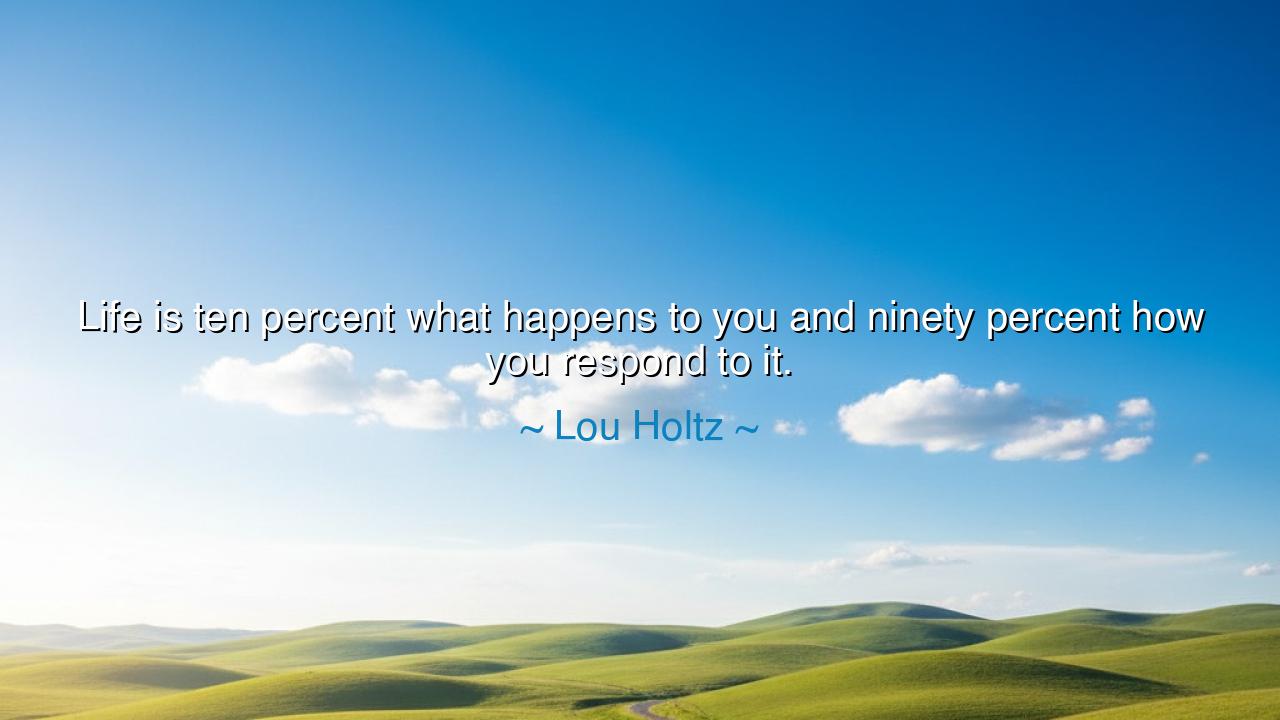
Life is ten percent what happens to you and ninety percent how






“Life is ten percent what happens to you and ninety percent how you respond to it.” Thus spoke Lou Holtz, the wise coach and mentor whose lessons extended far beyond the playing fields of sport and into the deeper arena of the human soul. In this single sentence, he distilled the essence of resilience, the timeless truth that while fate may cast the stones of our journey, it is our spirit, our attitude, and our response that determine the shape of our destiny. His words are a hymn to human strength — a reminder that though we cannot control the winds, we can always set the sails.
Lou Holtz, who rose from humble beginnings to become one of the most respected football coaches in American history, spoke not from privilege but from experience. He knew defeat and failure as intimately as triumph and victory. Through years of challenge — of building teams, guiding young men, and facing setbacks — he discovered that the difference between success and despair lay not in circumstance but in character. It is easy, he taught, to rise when fortune smiles; it is divine to rise when fortune falls. Thus, this quote was not born in comfort but in the fire of perseverance — a truth hammered on the anvil of struggle.
To understand his meaning, one must look beyond the numbers. “Ten percent what happens to you” — this is the realm of fate, of the world’s unpredictable storms. It includes loss, betrayal, failure, illness — the endless trials that visit every life. These things we cannot always choose, for life is not bound by fairness or predictability. But “ninety percent how you respond to it” — this is the realm of freedom, of choice, of inner mastery. Here lies the power that no storm can steal: the ability to shape our response, to turn adversity into strength, pain into wisdom, defeat into rebirth.
History is filled with those who proved this truth through their lives. Consider Nelson Mandela, who spent twenty-seven years in prison, stripped of freedom, power, and comfort. The world dealt him the harshest hand imaginable — yet his response was one of grace and purpose. Instead of letting bitterness consume him, he cultivated forgiveness, patience, and vision. When he emerged, he did not seek vengeance but reconciliation. Mandela’s life was not ten percent what happened — imprisonment, injustice, betrayal — but ninety percent how he chose to meet it. In that choice, he turned suffering into salvation, both for himself and for his nation.
Holtz’s teaching echoes the wisdom of the ancients. The Stoic philosopher Epictetus once said, “It’s not what happens to you, but how you react to it that matters.” The Buddha taught that suffering arises not from events themselves, but from how we perceive and cling to them. Even the Scriptures proclaim that trials refine the spirit like gold in fire. Across all ages, the wise have agreed: the heart of man is tested not by what he endures, but by how he endures it. For circumstance is the sculptor’s tool, but response is the sculptor’s hand.
And yet, Holtz’s wisdom is not cold or distant. He does not tell us to deny our pain or suppress our emotion, but to transform them. To respond well is not to ignore sorrow, but to rise through it. It is to take the blow, to feel its weight, and yet to stand — not out of denial, but out of courage. It is to say, “This may wound me, but it will not define me.” Such resilience is not built overnight; it is forged in daily choices — in patience when anger tempts us, in hope when despair beckons, in gratitude when we have little left.
So, my child, remember this truth as a sacred compass for your journey: you cannot always choose the storms, but you can choose your stance beneath them. When hardship comes — and it will — pause and ask not “Why me?” but “How shall I meet this?” Do not curse the ten percent that happens; master the ninety percent that belongs to you. Stand firm, breathe deeply, and let your response be your strength.
For in the end, this is the secret of the wise and the courageous: they do not wait for the world to change; they change themselves. They understand that the measure of life is not found in what befalls us, but in the spirit with which we rise. And when that spirit stands tall — calm in adversity, grateful in trial, and steadfast in hope — no power on earth can diminish it. Then, and only then, will you understand Lou Holtz’s eternal truth: that the quality of your life is not written by fate’s hand, but by your own response to it.






AAdministratorAdministrator
Welcome, honored guests. Please leave a comment, we will respond soon